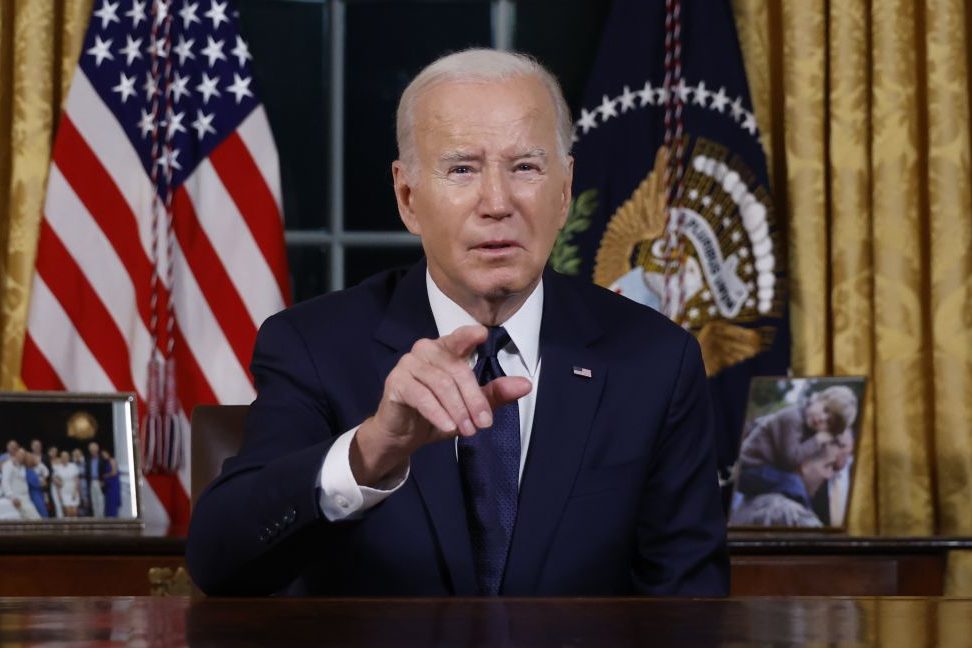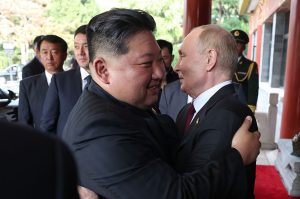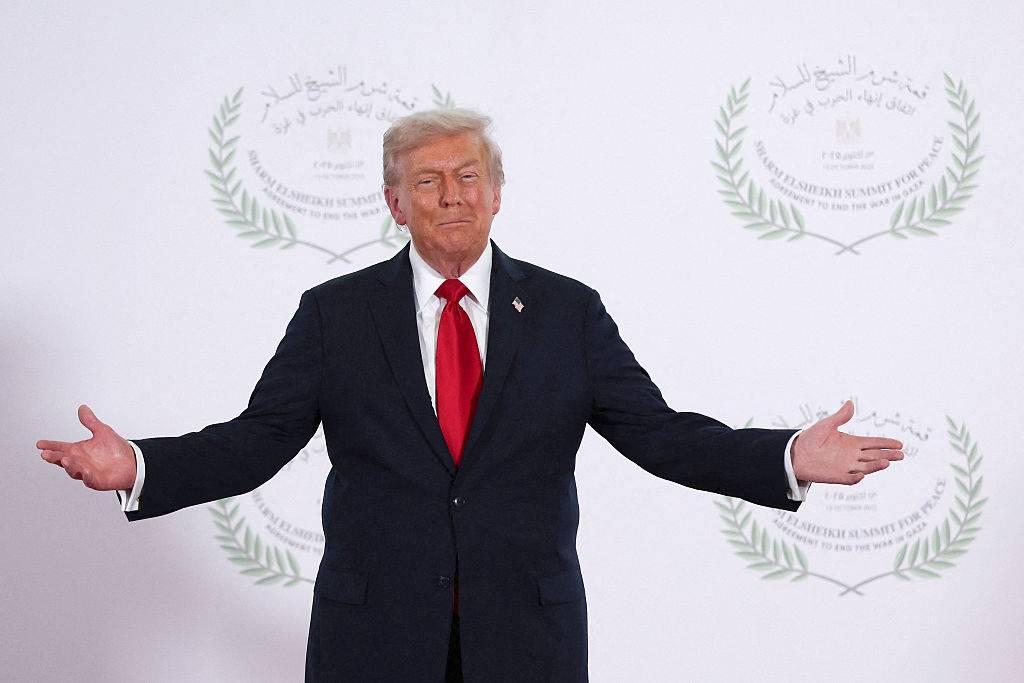A primetime address in the Oval Office is the pinnace of presidential speechifying. Ronald Reagan used the room in 1986 to console the nation after the Challenger blew up on live television. George W. Bush declared the global war on terrorism there. Donald Trump leveraged the weight of the Resolute Desk as he talked to Americans about a deadly but mysterious virus called Covid-19 for the first time.
Tonight, it was Joe Biden’s turn. The topics, the wars in Ukraine and Israel, couldn’t be more different with respect to the players, the stakes or the circumstances leading up to them. Even so, Biden tried to convince the American people on the idea that the two wars were one and the same. ”Hamas and Putin represent different threats, but they share this in common: they both want to completely annihilate a neighboring democracy, completely annihilate it,” he said. It was up to the United States, he insisted, to ensure the tyrannical Vladimir Putin and the bloodthirsty terrorists of Hamas didn’t succeed, lest faith in America’s global leadership depreciates.
Biden’s speech was a sales pitch. Nothing more, nothing less. Having flown back to Washington from Israel the previous day, he is obviously deeply impacted by the carnage that occurred on October 7, the worst day in the nation’s history in half a century. Given the gruesome videos and photos of Hamas’s hours-long assault, not to mention the ongoing saga over the fate of the roughly 200 people who were taken back to the Gaza Strip as captives, it’s almost unfathomable anybody could feel anything other than dread and sadness. Palestinian civilians are suffering enormous hardships as well; Gaza, known colloquially as the world’s largest open-air prison due to the border restrictions imposed by Israel and Egypt, is now awash in rubble, rebar, tears, desperation and hopelessness. Combine this awful situation with Israel’s upcoming ground invasion, as well as Hamas’s propensity to use civilians as human shields, and the overall picture will get even uglier as the days and weeks go on.
Thousands of miles away, Ukrainian and Russian forces continue to pummel each other with all kinds of munitions in the hope of moving a 600-mile-long frontline a few miles in either direction. Ukrainian president Volodymyr Zelensky and Putin are both preparing for a long, drawn-out war — and neither man is even remotely interested in exploring a ceasefire or negotiated settlement, more than a year and a half into the conflict. Biden, who secretly went to Kyiv last winter to greet Zelensky in a show of support, has been intimately involved in US policy on Ukraine since he was Obama’s vice president. Much like the war in Israel, the war in Ukraine strikes a personal chord.
But that’s where the similarities end. After listening to Biden, you could be forgiven for believing a powerful, hidden sinister hand was behind all of the killing — or that Putin, Hamas, Iran and North Korea were all connected in one evil alliance bent on world domination. Iran, Biden said, is not only a major external financial sponsor of Hamas but also selling hundreds upon hundreds of attack drones to the Russian army for use in Ukraine. He’s right on both counts, but wrong to suggest that Tehran’s decisions are somehow motivated by anything other than pragmatism and necessity — pragmatism because the Iranians are no doubt hoping that Putin will remember all the assistance and eventually pay it back down the line; necessity because any source of cash is welcome. The same thing could be said of Putin, by the way: his relationship with Iran is just as much about acquiring desperately needed military platforms for a war of attrition as it is about frustrating US objectives in Europe and the Middle East. What Biden and some foreign policy commentators see as a global conspiracy between fellow authoritarians is in actuality a series of mutually beneficial ties that work fine today but perhaps not so well tomorrow.
Biden may despise endless wars and unnecessarily foreign entanglements (see: Afghanistan and Libya) but he is still a liberal internationalist at heart. He firmly believes the US is what former secretary of state Madeleine Albright once called the ”indispensable nation,” a superpower that holds its adversaries at bay and works on behalf of the common good. Most of his foreign policy speech is laced with the phrase ”rules-based international order” and America’s unique place in defending it. This, too, was at the heart of the president’s remarks this evening, even if he didn’t actually utter the phrase. In fact, he didn’t need to. The implication was there: the US must step up because others simply won’t. The alternative to US primacy is chaos. The US either beats the aggressor or the aggressor wins. Or, as he told Americans, ”history has taught us that when terrorists don’t pay a price for their terror, when dictators don’t pay a price for their aggression, they cause more chaos and death and more destruction.”
Maybe. But maybe not. Putin may fancy himself a twenty-first century version of Peter the Great, but the army he presides over has proved itself countless times to be little more than a modern-day relic of the old Soviet Red Army: big in size but clunky, incompetent and unimpressive in terms of quality. Could Putin have his eyes set on Georgia, Moldova or the Baltics after winning in Ukraine? Perhaps. But it’s also an academic question, because the Russians can’t even take a mid-sized city like Bakhmut without expending 20,000 lives and many, many months. Hamas might dream of wiping Israel off the map but they don’t have the capacity to do it — and if Israel’s military response over the last twelve days is a hint of what’s to come, Hamas could be a shell of its former self by the time its war with Israel is over.
The US, Biden stressed, is at an “inflection point in history.” The phraseology is overly dramatic. But sometimes sales pitches need them, even if the underlying case is a bit flawed.

























